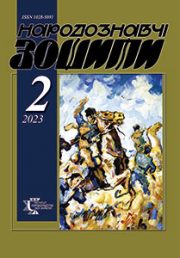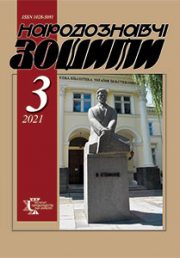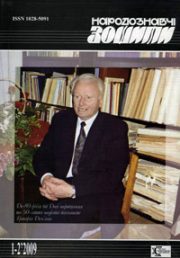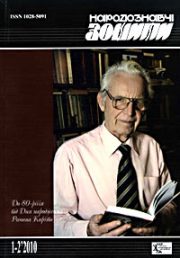The Ethnology Notebooks. 2021. № 4 (160), 962—970
UDK930.2:[323.28:355.425.4(477.83-22)”194/195″](093.2)
DOI https://doi.org/10.15407/nz2021.04.962
A FEW WORDS ABOUT REPRESSED AND POLITICAL PRISONERS FROM VOLOSIANKA
SOKIL Vasyl
- ORCID ID: http://orcid.org/0000-0003-3164-1217
- Doctor of Philology, Professor, Head of Department
- The Ethnology Institute of the National Academy of Sciences of Ukraine,
- Department of Folklore,
- 15, Svobody Avenue, 79000, Lviv, Ukraine,
- Contacts: e-mail: vasylsokil@gmail.com
Abstract. Among the historical events of the mid-twentieth century in Western Ukraine, the national liberation struggle against the Soviet occupation played an important role, as marked by its victories, often mass repressions against those involved and the local population in the form of torture, imprisonment or exile for military or political activities inconsistent with the totalitarian system. The article is based on a biographical survey of individuals from Volosianka Skole district of Lviv region.The focus is made on historical information about them, the stories of the participants themselves or the stories of their relatives. Thus, the diversity of opinions and assessments is reflected. They are the subject of research.
An active educator, an Ostarbeiter and later a political prisoner in Norilsk is mentioned in the investigation concerning A. Hrytsiv. The research studies are made about participant of the national liberation struggle, a multiple prisoner of the Vorkuta, Mordovian, and Permian camps M. Lutsyk, while secret fighter V. Markovych was exiled to Siberia. The fate of the girl-detainee Ye. Yurkiv and the way to Vorkuta is impressive. The Tukhlian family was separated due to «a mistake in the surname — the wife received real six years of exile in the Far East. The mother and daughter of the Furivs were taken out under someone else’s name; the latter married Ya. Hrytsiv, the people’s «enemy».
The article is aimed at shedding light on the biographical information of the stakeholders in the national liberation struggles of the 1940s and 1950s, especially their opposition to the occupying power and the valiant persecution in the NKVD, exiles, and prisons.
The source basis for writing the proposed publication includes encyclopedic articles, information about the birth of a person, pedigree, drawn from the metric books in the parish archives of the village. A significant share is taken by narratives that reveal the theme of the national liberation struggle.
The research methodology is based on the analysis of relevant historical, biographical information, archival data, opinions and views of relatives, field observations of the author.
Keywords: national liberation struggle, UPA, repressions, exiles, political prisoners.
Received 21.07.2021
REFERENCES
- Metric book of Volosyanka (beginning of the XIX — middle of the XX century). In Parokhial’ny arkhiv of v. Volosyanka (Arc. 221) (Stored in the local church) [in Ukrainian].
- Reading room «Enlightenment» in Volosyanka. Notice dated December 31, 1934. In Tsentral’ny derzhavny istorychny arkhiv u Lvovi. F. 348. Op. 1. Od. zb. 1645. Ark. 22 [in Ukrainian].
- Reading room «Enlightenment» in Volosyanka. Notice dated January 26, 1936. In Tsentral’ny derzhavny istorychny arkhiv u Lvovi. F. 348. Op. 1. Od. zb. 1645. Ark. 22 [in Ukrainian].
- Certificate of the Church Council on the payment of money for repair work to AP Hrytsiv dated June 14, 1959. In Parokhial’ny arkhiv v. Volosyanka (Arc. 1) [in Ukrainian].
- Contract № 53 for repair works to the population, issued to AP Hrytsiv February 27, 1976. In Parokhial’ny arkhiv v. Volosyanka (Arc. 2) [in Ukrainian].
- Receipt issued by the Church Council to AP Hrytsiv for repair work April 19, 1981. In Parokhial’ny arkhiv v. Volosyanka (Arc. 3) [in Ukrainian].
- Ovsienko, V. (2017). Lutsyk Mykhailo Petrovich. Encyclopedia of modern Ukraine (Vol. 18, p. 147) [in Ukrainian].
- Pashchenko, V. (2018). Markovich Vasil Onisimovich. Encyclopedia of modern Ukraine (Vol. 19, p. 245). Kyiv [in Ukrainian].
- Pashchenko, V. (2016). Soldier of the Ukrainian Insurgent Army of Boykivshchyna and Zaporizhia. Bell, 7, 177 [in Ukrainian].
- Repressed and political prisoners. Zap. July 27, 2017 V. Sokil from Mykola Tukhlyan, born in 1956, in the village of Volosyanka, Skole district, Lviv region. The home archive of V. Sokil. Arc. 5—9 [in Ukrainian].
- Repressed and political prisoners. Zap. July 8, 2017 V. Sokil from Yurkiv (Mushtuk) Euphrosyne in the village of Volosyanka, Skole district, Lviv region, The home archive of V. Sokil. Arc. 12—15 [in Ukrainian].
- Repressed and political prisoners. Zap. July 12, 2018 V. Sokil from the words of Yarema Hrytsiv’s daughter Maria (Bilynets) in the village of Volosyanka, Skole district, Lviv region. The home archive of V. Sokil. Arc. 18—23 [in Ukrainian].







